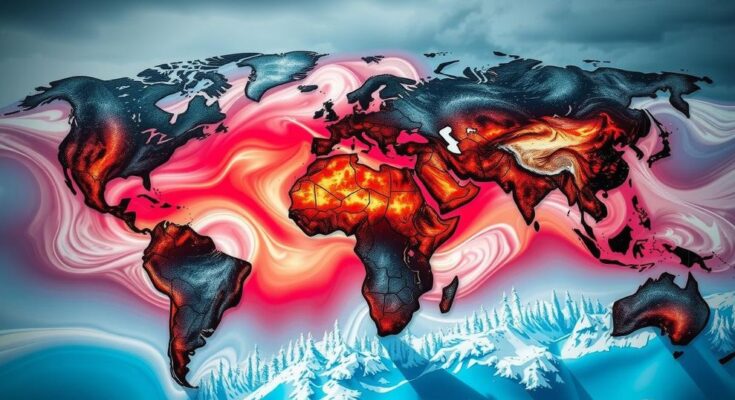The year 2024 is projected to be the warmest on record, as announced by the World Meteorological Organization (WMO). This follows a decade of unprecedented heat fueled by rising greenhouse gas levels. Immediate action is critical, as emphasized by UN Secretary-General António Guterres and WMO Secretary-General Celeste Saulo, with efforts focusing on reducing emissions and adapting to climate changes, particularly in response to extreme weather events.
The World Meteorological Organization (WMO) has announced that 2024 is projected to be the warmest year recorded, reflecting a decade characterized by unprecedented human-induced heat levels. This alarming trend is attributed to continually rising greenhouse gas concentrations, which have reached unprecedented heights, ensuring the retention of additional heat in the atmosphere.
UN Secretary-General António Guterres reiterated the gravity of the situation in his New Year address, stating, “Today I can officially report that we have just endured a decade of deadly heat. The top ten hottest years on record have happened in the last ten years, including 2024.” He emphasized the urgency of immediate action to mitigate climate change impacts, urging nations to dramatically reduce emissions and transition toward renewable energy.
Celeste Saulo, the WMO Secretary-General, emphasized the organization’s commitment to addressing climate challenges during its upcoming 75th anniversary in 2025, stating, “If we want a safer planet, we must act now. It’s our responsibility. It’s a common responsibility, a global responsibility.” The WMO continues to issue alerts and reports detailing the intensifying nature of climate change, highlighting record-breaking temperatures and their associated extreme weather events.
Climate change has intensified many severe weather phenomena, which have led to tragic loss of life and widespread displacement. The WMO noted that in 2024, an additional 41 days of severe heat were attributed to climate change, aggravating health issues and impacting ecosystems. This urgent need for international collaboration was underlined during a December conference that sought to establish a coordinated framework aimed at addressing the rising threats from extreme heat.
Moving forward, there will be a concentrated effort to enhance awareness and strategies regarding the climate changes affecting the cryosphere as part of the International Year of Glaciers’ Preservation slated for 2025. Furthermore, the WMO’s initiatives align with global efforts to adapt to and mitigate climate change through improved surveillance, reporting, and community preparedness.
The article discusses the pressing issue of climate change as observed in the year 2024, which is predicted to be the hottest year on record. This conclusion is drawn from ongoing data analysis by the World Meteorological Organization, which has raised alarms concerning record greenhouse gas levels and the subsequent impact of these phenomena on global temperatures and extreme weather events. The documented increase in temperature and the heightened frequency of severe weather conditions underscore the critical need for immediate international cooperation and effective mitigation strategies to combat climate change effects.
In summary, the year 2024 signifies a critical juncture in the ongoing battle against climate change, with record temperatures and extreme weather events exemplifying the urgent need for action. The leadership from organizations such as WMO and the UN emphasizes the necessity of collective responsibility among nations to cut emissions and foster a renewable energy transition. As the world heads toward 2025, significant initiatives targeting climate change adaptation and mitigation will be paramount to ensure a sustainable future.
Original Source: wmo.int




